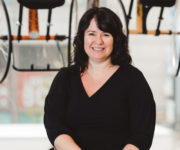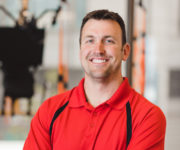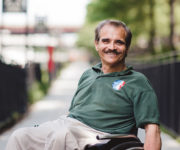Meet the Match
A Venezuelan Races Toward a Brighter Future
Mercedes Gomez knows how quickly life can change. In fact, it only takes one moment.
As a teenager, Mercedes left San Cristobal, Venezuela, where she was born and raised, to build a life and career for herself in Suriname. One night while hanging out with her friends, however, the driver of the group’s vehicle lost control with Mercedes in the passenger seat and crashed.
“In one moment, all my plans for my life were gone,” Mercedes says. “When you’re young you think nothing bad can happen to you—I could’ve died.”
The accident caused a severe injury to her spine, and Mercedes back to Venezuela for rehabilitation. Transitioning into life as a wheelchair user, she felt depressed and helpless.
“My father would carry me like a baby from room to room,” Mercedes recalls. “One day I looked around and I saw him in pain. I saw my mother exhausted and my daughter sad. I realized then that I couldn’t give up. I had to rebuild my life.”
With perfect timing, Mercedes discovered wheelchair racing. On the racetrack she had renewed purpose. Without a specially-designed sports wheelchair, Mercedes completed her first 35 races in her regular chair. She recalls one occasion when she medaled, only to discover that the winner’s podium had no ramps for the wheelchair users to receive their prizes.
Inequalities increasingly drove Mercedes to make a difference. She moved to Caracas to pursue a master’s degree in hospitality and tourism at the National Experimental University of the Armed Forces (UNEFA). In the Venezuelan capital, she received a donated sports wheelchair and began training with the Paralympic team—the first time she was around elite level athletes with disabilities.
Over the past four years, Mercedes’ racing career has taken off. She is a multiple-time national champion, winning more than 100 career medals in the 100m, 200m, 400m, and 800m, 1500m, as well as in wheelchair marathon events. Since 2014, she has competed at the Los Angeles and New York City marathons.
“One day after practice, I asked myself, ‘Now what are you doing to help other people with disabilities?’” Mercedes says. “I’m a woman with a disability, a mom, and an athlete—if I put that all together I know I can do something good to support others. I don’t want to be the only Venezuelan woman competing on the racetrack.”
In 2015, she was approached by Achilles International—an international NGO devoted to creating racing opportunities for people with disabilities—about creating a chapter in Venezuela. The organization was interested in supporting the development of wheelchair racing from the grassroots level upward. The offer streamlined very well with Mercedes’s hopes to create a greater impact across society. Mercedes partnered with the existing organization, Discapacidad Cero (Zero Disability), and currently runs the Achilles’ Venezuelan chapter as an affiliated program.
According to census data from 2011, six percent of Venezuelans—1.8 million—have a disability. Mercedes and her organization use sports as a tool to include this population in society through several ways: providing sports programs for children, supporting racers to participate in national and international competitions, and running social awareness campaigns focused around inclusion, tolerance, and equal treatment of people with disabilities.
“In Venezuela, people aren’t educated in schools about how to treat people with disabilities,” Mercedes says. “Society is not disability-friendly. We can talk about accessibility in terms of ramps and building, but what happens when I get inside the building and the attitudinal barrier is larger than the physical barrier?”
Mercedes sees sport as a bridge between people with and without disabilities, recreational athletes and Paralympians, and the hopeless with the hopeful.
“Sport is like food for your body and mind that builds you into a complete and healthy person,” Mercedes says. “Life stops for many people after a disability. Sport restarts it.”
With the goal of establishing Achilles Venezuela as a sustainable entity, Mercedes needed the support of a mentor to help her develop strong partnerships with the government and private sectors, and maximize the organization’s reach across Venezuela. Stephanie Kanter, business support manager for the Rehabilitation Institute of Chicago (RIC), has been with the organization for more than a decade and was the woman to guide Mercedes on this journey. RIC is a highly-respected trailblazer in rehabilitative medicine and adaptive sports programming in the United States. Stephanie, who also serves on the Chicago Commission on Human Relations, was supported as a mentor by Derek Daniels, RIC sports and fitness programs manager, and Larry Labiak, disability policy officer for the Chicago Park District, who previously served as mentors on the program. Together, this strong combination of disability sport leaders worked to create a comprehensive social impact plan that gets more Venezuelan wheelchair users active on the racetrack and in society.



